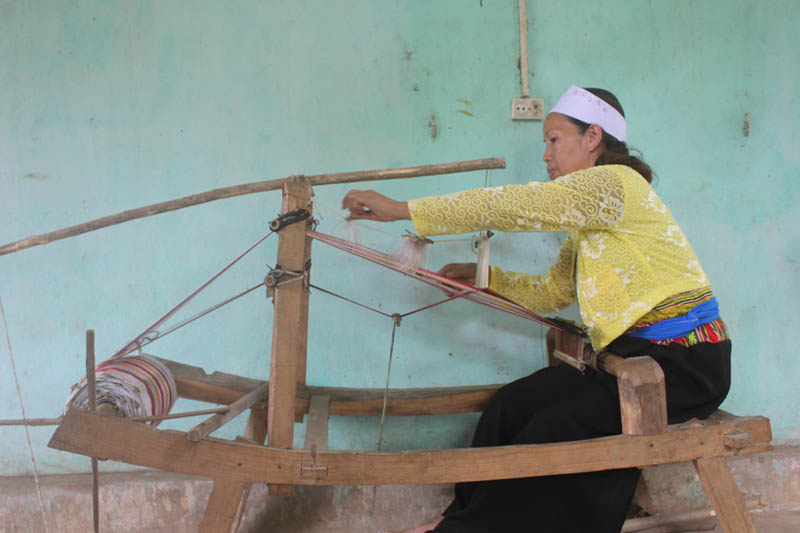
(HBO) – To Duong Thi Bin, brocade weaving is not only a job but also a passion. The woman, who comes from Luc hamlet, Yen Nghiep commune, Lac Son district of Hoa Binh province, always wants the brocade weaving will be preserved and developed in her hometown and her love for brocade has lit up faith of young generation in the future of the traditional craft.
The establishment of Luc Nghiep Thanh Limited Company,
a local brocade producer, has created jobs for more than 200 women in the
commune, showing the vitality of the brocade craft and those who are
enthusiastic about traditional cultures.
Since an early age, Bin has been very curious and
exciting when observing women in her village sitting in front of the looms and
weaving the brocades every day. That motivated her to learn how to weave in the
hope of making Muong colourful traditional dresses, pillows or blankets with
her own hands.
Over three decades have gone by since then, which is
also the time she has worked with brocade. She is now among the most skillful
at brocading and also the director of the company.

Duong Thi Bin works
ardently in front of the loom.
Bin used to be a member of the communal Women’s
Union. In 2008, she and other women at her hamlet
received 50 million VND from the employment support fund of the union to build
the looms. With a determination to preserve the brocade weaving which was
facing threat of oblivion, she decided to open her own brocade company two
years later, giving job opportunities for many local women.
At the beginning, her company has been given support
by the local industry promotion centre, which has provided 200 local workers with
three-month training courses on weaving. Now the company has many skillful weavers,
capable of passing their knowledge to others.
As the company’s leader, Bin joined hands with her workers to create numerous
brocade products like bags, scarves, skirts and shirts.
Bin said that her great passion for brocade beauty has required her to work to
preserve the country’s traditional craft by spreading it among the young
generation. Since the company was set up, communal women have stronger
attachment to brocade weaving.
In the first days, Bin herself found consumption markets for her brocade
products. After joining local fairs and those held in neighbouring provinces,
her products have been present in many localities across the country like Thanh
Hoa, Phu Tho, Son La and
Ho Chi Minh
City. Although there has been yet large order, her
company still maintains small ones. Old ethnic women sell brocades at rural
markets as a way to protect the culture.
Currently, the company has 168 members, however, the number of weaving looms
reaches 300 at peak.
Bin and six or seven skillful women opened brocade training courses for the
younger generation in the commune. They share weaving experience in their free
time to complete their weaving skills. Products made by the company are famous
for good quality, diversified designs and reasonable prices, thus gaining trust
from customers./.
With an increasingly vibrant and widespread emulation movement aimed at building cultured residential areas and cultured families, Yen Thuy District has been making steady progress toward improving both the material and spiritual well-being of its people, while fostering a civilized, prosperous, beautiful, and progressive community.
Once lacking recreational spaces and community facilities, Residential Group 2 in Quynh Lam Ward (Hoa Binh City) has recently received attention for the construction of a new, spacious, and fully equipped cultural house. The project followed the model of state support combined with public contributions in both labor and funding.
The "All people unite to build cultural life" movement, which has been effectively integrated with Kim Boi district’s socio-economic development goals, is fostering a lively spirit of emulation across local residential areas, hamlets, villages, public agencies, and enterprises. In addition, through the initiative, traditional cultural values are being preserved and promoted, while community solidarity and mutual support in poverty reduction and economic development are being strengthened.
A working delegation of the Hoa Binh provincial People’s Committee led by its Permanent Vice Chairman Nguyen Van Toan on June 11 inspected the progress of a project to build the Mo Muong Cultural Heritage Conservation Space linked to tourism services in Hop Phong commune, Cao Phong district.
Born and growing in the heroic land of Muong Dong, Dinh Thi Kieu Dung, a resident in Bo town of Kim Boi district, in her childhood was nurtured by the sweet lullabies of her grandmother and mother. These melodies deeply imprinted on her soul, becoming an inseparable part of her love for her ethnic group's culture. For over 20 years, this love for her hometown has driven Dung to research, collect, and pass down the cultural values of the Muong people to future generations.
In the final days of May, the Ethnic Art Troupe of Hoa Binh Province organized performances to serve the people in remote, mountainous, and particularly disadvantaged areas within the province. These were not just ordinary artistic shows, but they were the meaningful journeys aimed at spreading cultural values, enhancing the spiritual life of the people and contributing to the preservation of ethnic minority cultural identities.



